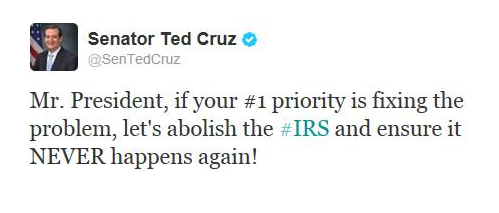The IRS exerts a lot of control over the American people. The agency has the power to collect our income, seize our assets, and imprison us for non-compliance. Filing a tax return puts a considerable amount of personal information into the hands of agents who have proven to be less than ethical. It is troubling to think that next year the details of our health care will be added to the charities, political organizations, and group affiliations often included on returns, along with bank account information and business dealings.
Power is at the root of the IRS scandal, as Peter Suderman points out in Reason Magazine: “It’s not that the reasons don’t matter at all. They do. But in some ways the particular reasons miss the larger point. Power will find a reason. It always does.”
Make a mistake and the IRS will not accept ‘I didn’t know’ for an answer. Try telling an IRS agent that you are not “personally responsible” for your tax return during an audit. You will likely get an impatient stare and hours of unpleasant questioning. Amazingly, these are the types of answers that IRS officials decided to give during House and Senate hearings over the past two weeks.
Former IRS Commissioner Douglas Shulman made an incorrect deduction when he “assured” congress that conservative groups were not being targeted by the IRS in March of 2012. He later reappeared in front of congress in May of 2013 to admit that targeting had taken place. During questioning Mr. Shulman showed frequent signs of amnesia and was only certain that “he was not personally responsible.”
Mr. Shulman’s successor, former IRS Commissioner Steven Miller, was grilled by congress for withholding information. Mr. Miller argued that the targeting practices led to “bad customer service” and were the result of a large spike in applications for tax-exempt status. A closer examination revealed that no such spike in applications had occurred. He too could not explain why conservative groups were targeted by the agency he was hired to run.
Former IRS Director of Exempt Organizations Lois Lerner caused a stir during the House Oversight and Government Reform committee hearing when she invoked her Fifth Amendment right not to testify after delivering a brief statement.
“I have not done anything wrong,” she said. “I have not broken any laws. I have not violated any IRS rules or regulations and I have not provided false information to this or any other congressional committee.”
Imagine denying wrongdoing during an audit and then refusing to answer any questions. It didn’t work in Ms. Lerner’s case either. She was placed on administrative leave after refusing to resign from her position.
In light of the problems at the agency, Treasury Secretary Jacob Lew has directed the new acting director, Daniel Werfel, to conduct a 30-day review to uncover and fix any issues with management practices to prevent this issue from happening again.
Mr. Werfel is likely to learn that the practice of targeting specific groups by the IRS is difficult to stop. Using the IRS as a political weapon is an old tactic that enjoys bi-partisan support. FDR used the IRS to attack newspapers who disagreed with the “New Deal.” President Kennedy and President Lyndon Johnson silenced opponents by applying pressure from the agency. Under President Nixon the IRS targeted more than 10,000 individuals and groups for political reasons. While President Clinton was in office specific activists groups felt the wrath of a politically motivated IRS, as did liberal groups during the presidency of George W. Bush.
Senator Mike Lee (R-Utah) tore apart the IRS and its failed history in a recent press release: “At its core the IRS scandal is not the result of one party attacking another. It is the inevitable consequence of a federal government that has gotten too big and too expensive to control. The federal government’s massive bureaucracy is inherently dysfunctional, corrupt, intolerant, and incompetent — regardless of who is in charge.”
Former White House adviser David Axelrod argued that that given the “vast” size of government, President Obama could not have possibly known (or be responsible for) the actions of mid-level officials. By doing so Mr. Axelrod made the best argument for smaller government. If the “vastness” of government is eliminated, scandals will be much harder to hide and execute.
The IRS scandal shows that power hidden within a big government does terrible things. The current size of the agency allows power to act in far-reaching and corrupt ways. Historically we know that firing a few officials is the tried and true approach to not solving the problem. If President Obama and congress are serious about stopping the pattern of abuse and corruption within the IRS, they should heed a recent tweet sent by Senator Ted Cruz (R-Texas):
“Mr. President, if your #1 priority is fixing the problem, let’s abolish the #IRS and ensure it never happens again!”





